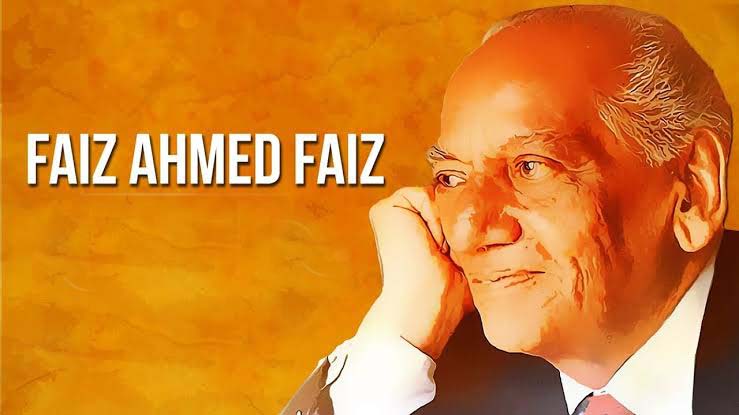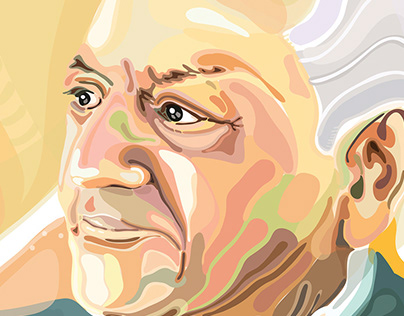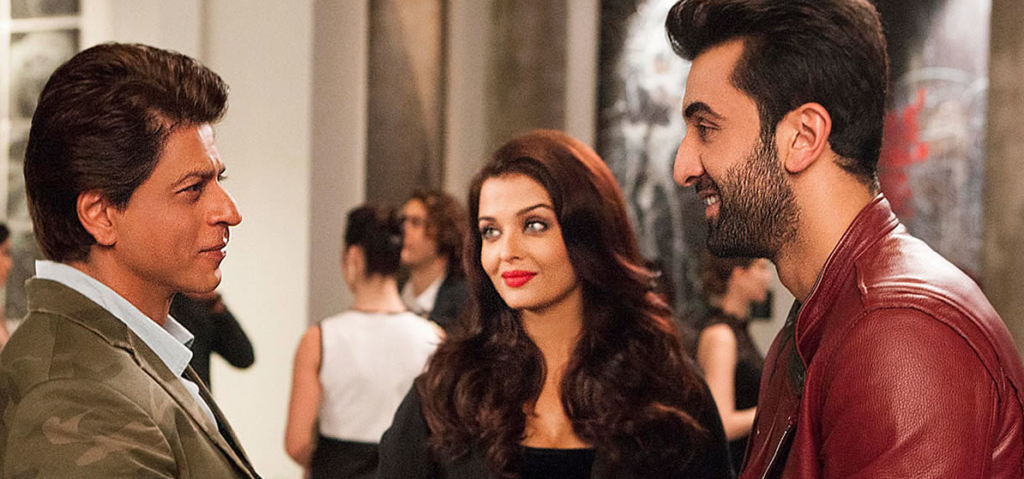Surkh wala, sauz wala, Faiz wala love
Hota hai jo love se jyada waise wala love
Ishq wala love…
I am sure most of the people reading this post would recollect these lines from a cheesy Hinglish song from Student Of The Year – a movie released in 2012. The lyrics mention a certain “Faiz” who is being referred to in context of types of love. I remember being introduced to Faiz Ahmed Faiz – the most celebrated and legendary Urdu poet of the 20th century – probably through this song. However, I didn’t probe him much, as until then, like most of the average poetry consumers, my knowledge and interest in Urdu poetry was limited to (and quenched by) the big old daddy – Ghalib.
In the subsequent years, Faiz kept coming to me through Indian cinema. I remember being intrigued by the beautiful recitation of “Gulon mein rang bhare, baad-e-nau bahaar chale; Chale bhi aao ke Gulshan ka karobar chale” in the movie Haider (the character playing Shahid Kapoor’s father recites this while he is in prison). After the movie, I looked it up to find out that it was a popular Ghazal sung by Mehendi Hassan – that being the highlight of my memory and not the fact that it was composed by Faiz Ahmed Faiz. I anyways had a thing for ghazals – partly because of the hopeless romantic I am and partly because I inherited it in my genes from my father.
A few years later and a few from this date at the peak of JNU/Tukde-Tukde/Anti-National students movement in the capital and across the country, Faiz again came striking my attention when there was a nationwide debate as whether the Nazm “Hum Dekhenge” was anti-Hindu. I looked up Hum Dekhenge – one of the most powerful and revolutionary Nazms ever written in any literature – only to find out that apart from being far from anti-Hindu (or anti-any-religion) it was unusually conscious-awakening: something our country direly needs in the circumstances it is right now. (I will not allow this beautiful post on my memories about Faiz be marred by a Machiavellian fascist masquerading as a democratically elected representative ruling our country). I looked up Hum Dekhenge voraciously online to understand it completely. I saw Javed Akhtar explain it word-by-word, line-by-line; I saw the beautiful RJ Sayema Rehman recite it with all her soul: the things that drew me to Faiz. I wasn’t surprised that I was drawn towards Faiz given my rebellious temperament and the arm-chair socialist I am.
By now, Faiz had been born within me and my mind and heart wanted to know him more and more. The universe now, more than ever before, conspires to get you what you want since browser cookies and the Pixel engine are its disposal. Hence, one day I would stumble across late Surekha Sikri reciting “Mujhse Pehli Si Mohabbat” in her beautiful voice and clear diction, the other day I would find out that the popular old Hindi song “Teri Ankhon Ke Siva Duniya Mein Aur Rakha Kya Hai…” is a line from this popular ghazal itself; the third day while watching Nawazuddin Siddiqui’s Manto I would discover that Manto (Saddat Hassan Manto) was a contemporary of Faiz and such coincidences and universe’s conjure to befriend me with Faiz wouldn’t just stop!
Giving into universe’s wish, I had now finally decided to get to know Faiz. It would have been 2018 or 2019. Manan had just introduced me to not-the-first-love-of-my-life – Rosé Wine. Cinema and pop-culture had wired me to the idea that Wine and Poetry (Urdu Poetry even more) go hand in hand. Hence, in the initial evenings that I had started having wine, I would unlock my phone to go to Rekhta (more about this beautiful website/platform in a separate blog-post) to discover what Faiz had for me in store that evening. While I had already read Mujhse Pehli Si Mohabbat quite a lot of times and Hum Dekhenge was already a favorite, I looked for creations beyond these two. One of my earliest discoveries of Faiz remains “Aye Kuch Abr, Kuch Sharab Aaye” – which I fell in love with instantly as it had all the elements that resonated with my personality – rains, clouds, wine, love, heartbreak”s” and most importantly optimism on whatever life has to offer. The last sher in the ghazal –
“Faiz” thi raah sar-ba-sar manzil;
Hum jahan pahonche kamiyaab aaye!
Transliteration: My journey/path itself is my destination and hence I was successful at each juncture in the journey.
became the sole anthem of my life. I recited this sher to myself in moments of anxiety, nervousness, self-doubt, before big occasions (and of course every time I wanted to impress a girl).
I unfailingly recited the first sher of the ghazal –
Aaye kuch abr kuch sharab aaye;
Iske baad aaye jo bhi azaab aaye
Transliteration: Let some clouds come, let some wine come. Let any disaster come after this.
whenever I had the soft curvy thing in my hand (I am referring to the wine glass before your imaginations run wild) and the universe was kind to have some clouds above to complete the effect.
The hopeless romantic I am, I would unswervingly recite in my mind –
Har rag-e-khoon mein charaghan ho;
Saamne jab wo benaqaab aaye!
Transliteration: Every drop of blood my veins lights up when she comes in front of me without her veil.
whenever I caught the first glimpse of my crush while we were meeting. It’s one thing to like someone and it is absolutely another to make it big in your head and heart with poetry – I don’t know which of the two I like more…
I kept reciting (and I still recite almost every other day) Aye Kuch Abr at every small or big occasion, day-by-after, year-by-year, irrespective of the company only to have it byhearted and make it a part of my personality.
While I was still not done absorbing Aye Kuch Abr in every bit of my consciousness, Faiz introduced me to Kuch Ishq Kiya Kuch Kaam Kiya – one of the simplest Nazms of Faiz – which I felt was just composed for the phase of life I was in. Since the creation is brief, it goes like –
kuchh ishq kiyā kuchh kaam kiyā
vo log bahut ḳhush-qismat the
jo ishq ko kaam samajhte the
yā kaam se āshiqī karte the
ham jīte-jī masrūf rahe
kuchh ishq kiyā kuchh kaam kiyā
kaam ishq ke aaḌe aatā rahā
aur ishq se kaam ulajhtā rahā
phir āḳhir tañg aa kar ham ne
donoñ ko adhūrā chhoḌ diyā
While I am still not done in life with either Ishq or Kaam, I related to the idea that love and work keep interfering with each other throughout one’s life. I perhaps related to it more because one of the girls I was semi-dating (yes, that’s a thing) lost interest in me because she found me too dedicated to my work (FMCG Sales beda-gark ho tumhara). In this case – usne tang aa kar mujhe chhod diya! (In hindsight – Thank God!). I also feel that we all have our phases mentioned in the Nazm – at some points in life we are so much in love that love becomes pretty much our work. At some points, we are so driven by our careers that it remains our only passion. Majority of us today boringly do a bit of both and unlike Faiz manage to balance them to stay afloat in life.
With every such Nazm or Ghazal I byhearted, I wanted to know Faiz the person more and more. Given his poetry, it is not difficult to estimate the romantic he would have been and the heartbreaks he would have had. One of my most fascinating memories in knowing Faiz has been the discovery of – Raqib Se. While all of us have fallen in love, lost our love, seen him/her get married to someone else, the latest maxima in the realm of unusual expression of heartbreaks is a Ranbir Kapoor singing Channa Mereya in her ex’s wedding. But what if I told you Faiz was way cooler that too a century ago?
Faiz was brought up in Sialkot, Pakistan where he fell in love with a girl and grew up with her. Faiz moved to Amritsar (undivided Punjab) for higher education and work during which the girl he loved was married to someone else (how cliché until now!). After partition Faiz returned to Sialkot and was contacted by this love of his who happened to be in Sialkot too! The girl wanted to meet Faiz WITH HER HUSBAND as her husband was a big fan and admirer of Faiz. (Waah re kismat) Faiz joyously agreed and to mark the occasion he composed Raqib Se (Raqib loosely translates to Rival/Saut/Sautan in Hindi) addressing the girl’s husband. A couple of shers from the Nazm that would pique your interest –
aa ki vābasta haiñ us husn kī yādeñ tujh se
jis ne is dil ko parī-ḳhāna banā rakkhā thā
jis kī ulfat meñ bhulā rakkhī thī duniyā ham ne
dahr ko dahr kā afsāna banā rakkhā thā
Transliteration: Today pertains to the memories of the beauty she is – the one who had made my heart a heaven. In whose love I had forgotten the entire world; in whose love the world rendered itself to mere fable for me.
āshnā haiñ tire qadmoñ se vo rāheñ jin par
us kī mad.hosh javānī ne ināyat kī hai
kārvāñ guzre haiñ jin se usī rānā.ī ke
jis kī in āñkhoñ ne be-sūd ibādat kī hai
Transliteration: Those paths are still familiar with her footsteps from where she had passed even once. The paths who were graced by her mesmerizing youth and beauty. Those paths had witnessed her beauty grace it, the same beauty that my eyes worshipped endlessly.
tujh se khelī haiñ vo mahbūb havā.eñ jin meñ
us ke malbūs kī afsurda mahak baaqī hai
tujh pe barsā hai usī baam se mahtāb kā nuur
jis meñ biitī huī rātoñ kī kasak baaqī hai
Transliteration: You have played with those mesmerizing winds which still have the scent of her clothes. You have been blessed to share the same roof and moonlight under which my nights with her remained unfulfilled.
tū ne dekhī hai vo peshānī vo ruḳhsār vo hoñT
zindagī jin ke tasavvur meñ luTā dī ham ne
tujh pe uTThī haiñ vo khoī huī sāhir āñkheñ
tujh ko ma.alūm hai kyuuñ umr gañvā dī ham ne
Transliteration (Faiz is telling this to the girl’s husband): You have seen that forehead, those cheeks, those lips – in whose imagination I passed my entire life. (WOW!) Those magical eyes now rise on you only – now you know why I just wasted my entire life!
I have translated the Nazm from whatever little Urdu I know so far, so pardon the minute inaccuracies. If you liked how cheeky and cheesy Faiz is here, you may read the full Nazm here on Rekhta.
While enough poems, plays and cinemas have romanticized heartbreaks – no depiction, no narration and no lament comes close to the uniqueness, directness and flair of Raqib Se. Raqib Se – according to me is the most decently daring that one can be to his/her ex. While I always wished I could write like Faiz, but I am far from having an ex as pretty as his on whose beauty I can compose a Raqib Se…
Over the next few months and years until now, Faiz continues to stay within me, helping me to cruise several emotions every day.
He offers me hope by saying –
dil nā-umīd to nahīñ nākām hī to hai
lambī hai ġham kī shaam magar shaam hī to hai
Transliteration: While my heart has failed, it is not devoid of hope. While the night is long, it is just a night (It’s gonna be morning tomorrow)!
dast-e-falak meñ gardish-e-taqdīr to nahīñ
dast-e-falak meñ gardish-e-ayyām hī to hai
Transliteration: The hand-of-sky is just running a temporary phase of bad-luck; the hand-of-sky does not have a bad fortune/destiny for me!
He tells me that I am falling in love when I read –
nasīb āzmāne ke din aa rahe haiñ
qarīb un ke aane ke din aa rahe haiñ
jo dil se kahā hai jo dil se sunā hai
sab un ko sunāne ke din aa rahe haiñ
abhī se dil o jaañ sar-e-rāh rakh do
ki luTne luTāne ke din aa rahe haiñ
chalo ‘faiz’ phir se kahīñ dil lagā.eñ
sunā hai Thikāne ke din aa rahe haiñ
He tells me not to give up when I read –
nahīñ nigāh meñ manzil to justujū hī sahī
nahīñ visāl mayassar to aarzū hī sahī
Transliteration: If the destination/goal is not in sight, keep searching until you find it. If union (with love) is not available for now, keep wanting for it until you get it!
In his lifetime, Faiz wrote 9 volumes of poetry. As I try to understand Urdu and Faiz a little with each passing day, I find more about myself and Faiz. The stories around which these poems were composed (like Raqib Se or Hum Dekhenge) make Faiz an even more interesting phenomenon. At the times and occasions I have stumbled across Faiz’s poetry in my life and times, I sometimes feel that the universe has allied with Faiz to make the most apt poetry of his reveal itself to me at the most appropriate moments in my life.
For tonight, to end this post and get back to my wine glass, once again –
“Faiz” thi raah sar-ba-sar manzil;
Hum jahan pahonche kamiyaab aaye!


